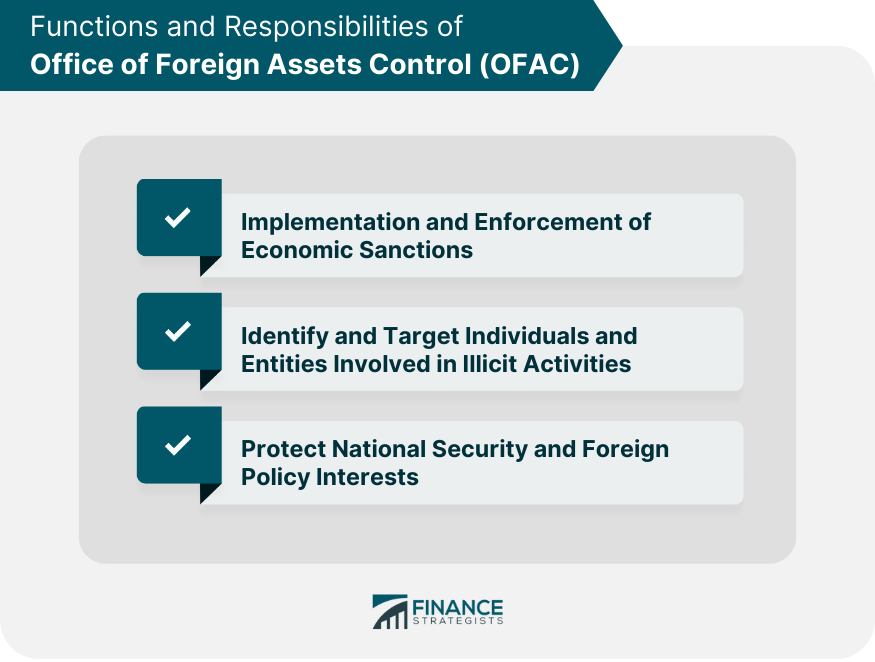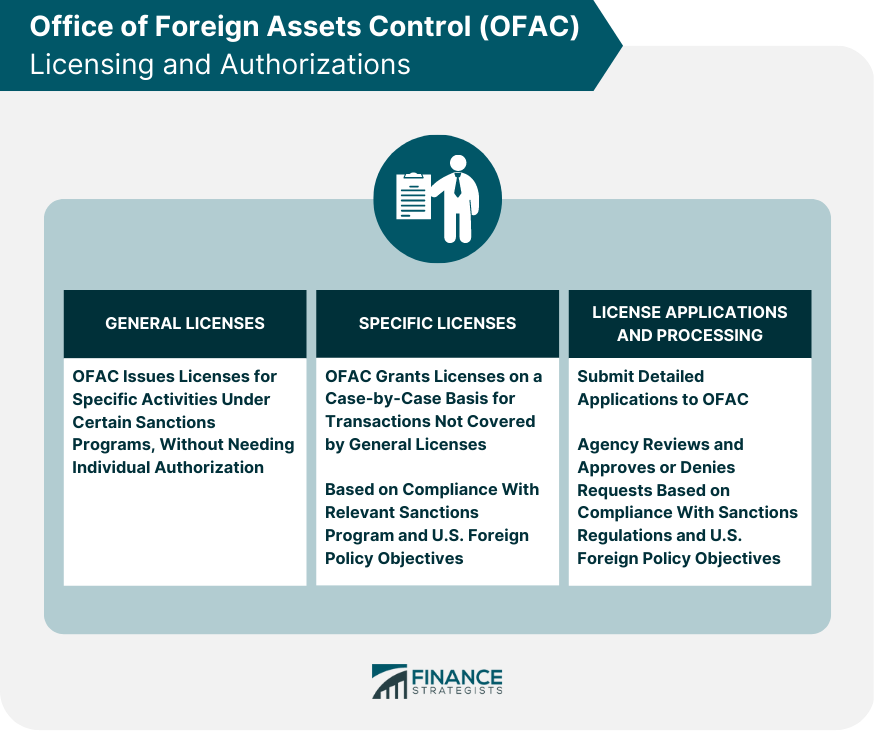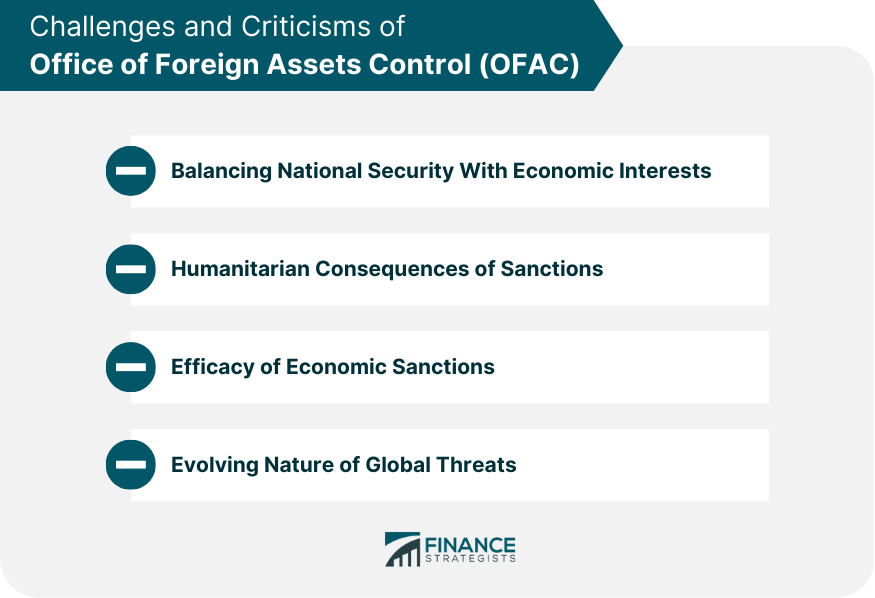The Office of Foreign Assets Control (OFAC) is a U.S. Treasury Department division responsible for implementing and enforcing economic sanctions. Established in 1950, it has played a crucial role in protecting national security and furthering foreign policy objectives. OFAC's primary role is to administer and enforce economic sanctions against targeted foreign countries, entities, and individuals involved in illicit activities. Its purpose is to protect U.S. national security, support foreign policy objectives, and promote global stability. OFAC was created in 1950 during the Korean War, following the issuance of several executive orders to freeze Chinese and North Korean assets. Over the years, its role has expanded to include various sanctions programs targeting threats to national security and global stability. OFAC is responsible for designing and implementing economic sanctions against targeted countries, individuals, and entities. These sanctions can include asset freezes, trade restrictions, and financial limitations to disrupt and deter illicit activities. OFAC works closely with other government agencies and international partners to gather intelligence and identify individuals and entities involved in terrorism, drug trafficking, and other threats. This information is then used to impose targeted sanctions, limiting their access to U.S. markets and financial systems. By enforcing economic sanctions, OFAC aims to protect U.S. national security and advance foreign policy interests. This can include promoting democracy, safeguarding human rights, or countering threats from hostile foreign actors. OFAC administers country-specific sanctions targeting governments or regions engaged in activities that threaten U.S. national security or violate international norms. Examples include Iran, North Korea, Venezuela, Syria, and Cuba, each of which faces unique restrictions based on their specific behaviors. OFAC enforces terrorism-related sanctions targeting individuals, organizations, and countries supporting or engaging in terrorism. These measures aim to cut off funding and resources to terrorists and disrupt their activities, safeguarding global security. OFAC also imposes sanctions on individuals, organizations, and countries involved in drug trafficking. These measures are designed to disrupt the financial networks and operations of major drug trafficking organizations, reducing the flow of illicit drugs and their associated violence. In response to human rights abuses, OFAC may impose targeted sanctions on individuals, organizations, or governments responsible for these actions. These measures aim to hold perpetrators accountable and promote respect for human rights around the world. As cyber threats become increasingly prevalent, OFAC has developed sanctions programs targeting individuals, entities, and countries engaged in significant malicious cyber activities. These sanctions aim to deter cyberattacks, protect critical infrastructure, and promote global cybersecurity. Businesses and financial institutions play a crucial role in ensuring OFAC compliance by conducting due diligence and screening transactions for potential sanctions violations. By actively monitoring and reporting suspicious activities, these entities contribute to the effectiveness of U.S. economic sanctions. Organizations subject to U.S. jurisdiction must comply with OFAC reporting requirements, including the submission of reports on blocked or rejected transactions. To avoid sanctions violations, businesses must also perform due diligence by screening customers, suppliers, and partners against OFAC's sanctions lists and staying up-to-date with changes in sanctions programs. Non-compliance with OFAC regulations can result in significant civil and criminal penalties, including fines, asset seizures, and even imprisonment. These penalties serve as a deterrent for potential violators and reinforce the importance of adherence to economic sanctions. To avoid OFAC violations, organizations should implement robust compliance programs, including employee training, regular risk assessments, and ongoing monitoring of transactions. Additionally, staying informed about changes to OFAC sanctions lists and regulatory updates is crucial for maintaining compliance. OFAC issues general licenses to authorize certain activities that would otherwise be prohibited under specific sanctions programs. These licenses provide a legal framework for U.S. persons to engage in specific transactions without the need for individual authorization. In cases where general licenses do not apply, OFAC may issue specific licenses to authorize particular transactions on a case-by-case basis. Specific licenses are granted in response to a formal application, and their approval depends on the nature of the transaction and the relevant sanctions program. To obtain a specific license, organizations or individuals must submit a detailed application to OFAC, providing all necessary information about the proposed transaction. OFAC then reviews the application, and either approves or denies the request based on its compliance with sanctions regulations and U.S. foreign policy objectives. The SDN List is a key tool used by OFAC to enforce economic sanctions, identifying individuals, entities, and organizations subject to U.S. sanctions. By placing individuals or entities on the SDN List, OFAC effectively blocks their access to the U.S. financial system and prohibits U.S. persons from engaging in transactions with them. The SDN List includes a wide range of individuals and entities involved in activities that threaten U.S. national security or violate international norms, such as terrorism, drug trafficking, human rights abuses, or nuclear proliferation. This list is regularly updated to reflect changes in sanctions programs and enforcement priorities. Designation on the SDN List carry significant consequences, including freezing assets under U.S. jurisdiction, prohibiting transactions with U.S. persons, and reputational damage. These consequences aim to deter illicit activities and encourage behavioral change among designated parties. Individuals and entities can petition for removal from the SDN List by providing evidence that they no longer engage in the activities that led to their designation. OFAC reviews these petitions and, if appropriate, may remove the individual or entity from the list, lifting the associated sanctions. OFAC works closely with foreign governments to share information, coordinate sanctions efforts, and enhance the effectiveness of economic sanctions. This collaboration helps to create a unified approach to combating global threats and promoting international stability. OFAC also partners with international organizations, such as the United Nations and the European Union, to develop and implement multilateral sanctions programs. These partnerships enable the U.S. to leverage the resources and influence of other nations in addressing shared global challenges. To identify and target individuals and entities involved in illicit activities, OFAC relies on sharing information and intelligence with domestic and international partners. This exchange of information is critical for maintaining the accuracy and effectiveness of OFAC's sanctions programs. One of the primary challenges facing OFAC is balancing the need to protect national security with the potential economic consequences of sanctions. While sanctions can effectively address threats, they can also have unintended consequences for U.S. businesses and the global economy. Critics often argue that economic sanctions can have negative humanitarian impacts on the civilian populations of targeted countries. OFAC strives to minimize these effects by incorporating exemptions for humanitarian goods and services, but challenges remain in ensuring that sanctions do not disproportionately harm innocent people. The effectiveness of economic sanctions as a foreign policy tool has been the subject of debate among experts and policymakers. While some argue that sanctions can effectively achieve policy goals, others contend that they often fail to produce the desired outcomes or can even be counterproductive. As global threats continue to evolve, OFAC faces the challenge of adapting its sanctions programs to address emerging issues such as cyber warfare, disinformation campaigns, and technological advancements. This requires ongoing reassessment of strategies and the development of new approaches to tackle these evolving challenges. The Office of Foreign Assets Control (OFAC) plays a vital role in protecting national security and promoting U.S. foreign policy objectives through the administration and enforcement of economic sanctions. As the global landscape continues evolving, OFAC must adapt its strategies and tools to effectively address emerging threats and challenges. Businesses, financial institutions, and individuals must remain vigilant in adhering to OFAC regulations to ensure the efficacy of sanctions programs and maintain compliance. To successfully navigate the complexities of OFAC regulations and sanctions compliance, it is essential to engage with a reputable banking services provider. By partnering with a knowledgeable financial institution, you can better understand and manage your obligations, ensuring that your organization remains compliant with all relevant regulations. Don't leave your compliance to chance—seek out expert banking services today to safeguard your business and contribute to global stability.What Is the Office of Foreign Assets Control (OFAC)?
Functions and Responsibilities of OFAC

Implementation and Enforcement of Economic Sanctions
Identifying and Targeting Individuals and Entities Involved in Illicit Activities
Protecting National Security and Foreign Policy Interests
OFAC Sanctions Programs
Country-Specific Sanctions
Terrorism-Related Sanctions
Narcotics Trafficking-Related Sanctions
Human Rights-Related Sanctions
Cybersecurity-Related Sanctions
OFAC Compliance and Enforcement
Role of Businesses and Financial Institutions
Reporting Requirements and Due Diligence
Penalties for Non-compliance
How to Avoid OFAC Violations
OFAC Licensing and Authorizations
General Licenses
Specific Licenses
License Applications and Processing

OFAC Specially Designated Nationals (SDN) List
Purpose and Function
Types of Individuals and Entities Included
Consequences of Being Designated
Delisting Process and Removal From the SDN List
OFAC International Cooperation and Coordination
Collaboration With Foreign Governments
Working With International Organizations
Sharing of Information and Intelligence
Challenges and Criticisms of OFAC

Balancing National Security With Economic Interests
Humanitarian Consequences of Sanctions
Efficacy of Economic Sanctions
Evolving Nature of Global Threats
Final Thoughts
Office of Foreign Assets Control (OFAC) FAQs
OFAC is responsible for administering and enforcing economic sanctions against targeted foreign countries, entities, and individuals involved in illicit activities to protect U.S. national security, support foreign policy objectives, and promote global stability.
OFAC administers various sanctions programs, including country-specific sanctions, terrorism-related sanctions, narcotics trafficking-related sanctions, human rights-related sanctions, and cybersecurity-related sanctions.
Designation on the SDN List can result in significant consequences, such as freezing assets under U.S. jurisdiction, prohibiting transactions with U.S. persons, and reputational damage.
Organizations can avoid OFAC violations by implementing robust compliance programs, including employee training, regular risk assessments, and ongoing monitoring of transactions. Staying informed about changes to OFAC sanctions lists and regulatory updates is also crucial for maintaining compliance.
OFAC faces challenges in balancing national security with economic interests, minimizing the humanitarian consequences of sanctions, ensuring the efficacy of economic sanctions, and adapting to the evolving nature of global threats. Critics also question the effectiveness of economic sanctions as a foreign policy tool.
True Tamplin is a published author, public speaker, CEO of UpDigital, and founder of Finance Strategists.
True is a Certified Educator in Personal Finance (CEPF®), author of The Handy Financial Ratios Guide, a member of the Society for Advancing Business Editing and Writing, contributes to his financial education site, Finance Strategists, and has spoken to various financial communities such as the CFA Institute, as well as university students like his Alma mater, Biola University, where he received a bachelor of science in business and data analytics.
To learn more about True, visit his personal website or view his author profiles on Amazon, Nasdaq and Forbes.















